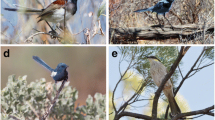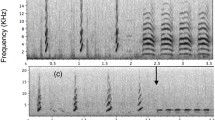Abstract.
Many mammals warn conspecifics with alarm calls about detected predators. These alarm calls are either functionally referential, urgency based, or they can have multiple functions, including predator deterrence. The taxonomic distribution of these alarm call systems is uneven, with primates providing the best-known examples for a functionally referential system and rodents most examples of an urgency-based system. Reports of different alarm call systems in lemurid primates prompted us to examine the anti-predator behavior of two additional lemur species. In an experimental field study we exposed adult redfronted lemurs (Eulemur fulvus rufus) and white sifakas (Propithecus verreauxi verreauxi) to playbacks of vocalizations of their main aerial and terrestrial predators, as well as to their own alarm calls given in response to the presentation of these predators. We scored the subjects' immediate behavioral responses, including alarm calls, from video recordings made during the first minute following a playback. We found that both species gave specific alarm calls only in response to raptor playbacks and the corresponding alarm calls, whereas calls given in response to carnivores and the corresponding alarm calls were also observed in other situations characterized by high arousal. Other behavioral responses, such as gaze and escape directions, corresponded to the hunting strategies of the two predator classes, suggesting that the corresponding vocalizations were categorized correctly. These two lemur species, which represent different families, have therefore independently evolved a mixed alarm call system, characterized by functionally referential calls for diurnal raptors, but not for carnivores. Electronic supplementary material to this paper can be obtained by using the Springer LINK server located at http://dx.doi.org/10.1007/s00265-001-0436-0
Similar content being viewed by others
Author information
Authors and Affiliations
Additional information
Electronic Publication
Rights and permissions
About this article
Cite this article
Fichtel, C., Kappeler, P.M. Anti-predator behavior of group-living Malagasy primates: mixed evidence for a referential alarm call system. Behav Ecol Sociobiol 51, 262–275 (2002). https://doi.org/10.1007/s00265-001-0436-0
Received:
Revised:
Accepted:
Issue Date:
DOI: https://doi.org/10.1007/s00265-001-0436-0




